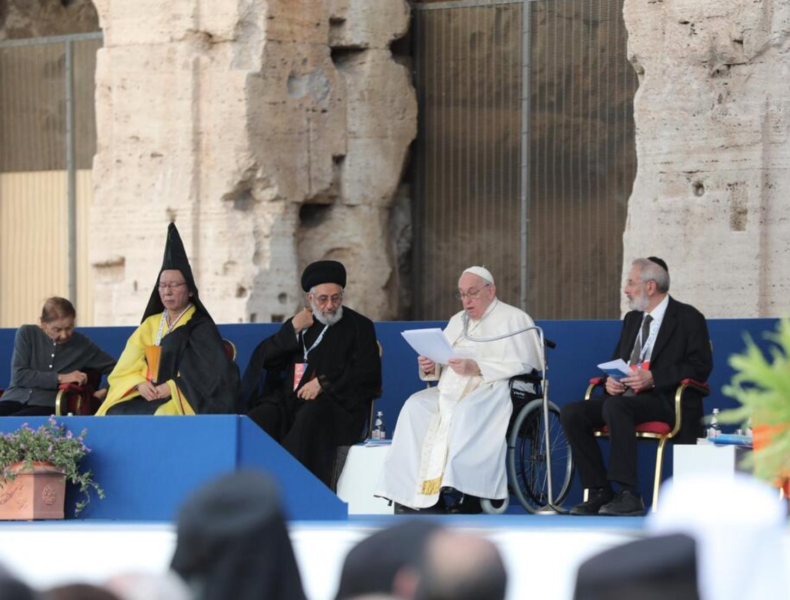Religions together at the Colosseum: “War, parent to all forms of poverty”

“After the horrors and the distress of the Second World War, the Nations were able to stitch the deep wounds caused by the war and, through multilateral talks, to create the United Nations, the result of an ambition that, today more than ever, is a necessity: peace. People must continue remembering that war, the parent to all forms of poverty, is an immeasurable tragedy”.
Such a concept is at the core of the speech given at the end of “The cry of peace”, organized in Rome by the secular, international movement “The Community of Sant’Egidio”. The meeting took place last week at the Colosseum and gathered Pope Francis and other religious leaders, among whom was the Rabbi of Rome rav Riccardo Di Segni, who sat right next to him.
 The last paper to be read addressed the question of humanity’s historical crossroad: “Either being the generation who lets the planet and humanity die, who collects and trades in weapons, who deludes themselves into thinking that it is possible to survive without cooperating with one another, or instead the generation who creates new ways of living together, does not invest in weapons, abolishes war as an instrument for resolving conflicts and stops the abnormal exploitation of the planet’s resources”.
The last paper to be read addressed the question of humanity’s historical crossroad: “Either being the generation who lets the planet and humanity die, who collects and trades in weapons, who deludes themselves into thinking that it is possible to survive without cooperating with one another, or instead the generation who creates new ways of living together, does not invest in weapons, abolishes war as an instrument for resolving conflicts and stops the abnormal exploitation of the planet’s resources”.
The Pope stated that “this year, our prayer has become a ‘cry’, because today peace is being seriously violated, wounded, trampled on. And this is happening in Europe, that is, in the continent that lived through two tragic world wars in the last century – and we are now living through the third one. Unfortunately, since then wars have never stopped draining the earth and staining it with blood, but the historical moment we are experiencing is exceptionally dramatic. This is why we have raised our prayer to God, who always listens to the anguished cry of his children”.
According to Marco Impagliazzo, president of The Community of Sant’Egidio, there is a need for “passion and imagination as an alternative to the current situation, because not only are we alarmingly stuck, but we are also on the verge of a much more serious catastrophe”. Peaceful alternatives do exist: “It is all about glimpsing them, showing them to others, making them walkable, walking them”.
“To cry for peace means having the courage to abandon everything to defend it. To quote Isaiah, peace needs to be built. It does not only mean absence of war, but also fullness and integrity. Peace is a shared joy”, said the Grand Rabbi of France, Rav Haïm Korsia, during the opening session of the meeting in a moment of reflection which also included the Italian President Sergio Mattarella, the French President Emmanuel Macron, the founder of The Community of Sant’Egidio Andrea Riccardi, the President of the Italian Episcopal Conference Matteo Ziti, the Secretary-General of the Muslim World League Shaykh Muhammad bin Abdul Karim al-Issa and a survivor to the war in Ukraine.
“Peace is always a call for a better future. Beware of a peace that makes us get comfortable. One never goes ‘in’ peace, but ‘towards’ peace”. These are the words of Rabbi Korsia, followed by a wish: “May the cries for peace cover the noise of the weapons. And may this noise be turned into laughter, hope and into the will to build something”.
During the three-day meeting, particular attention was paid to the value of life. The starting point of this in-depth analysis was the idea that every generation “has to rediscover the energies and ways to live together” and that, after a conflict, a long-lasting peace is not possible “without deep reconciliation and acknowledgement of the other”. It was the Chief Rabbi of Rome rav Riccardo Di Segni who explained the Jewish perspective on the subject.
“Life is a primary concern for us Jews, alongside with the observance of the Sabbath. We must do our utmost, even if the person in front of us has a few minutes left to live” said the Rav, quoting the sources from which these teachings are drawn. Values such as “the richness of diversity, the strength of weakness, the everlasting preciousness of life, of any life” were at the core of his speech. About these last months, the Rav then said: “We must oppose the idea that either ‘We are all Russians’ or ‘We are all Ukrainians’, but rather seek truth and critical thinking. Face to people who kill each other, we must declare ourselves devoted to life and justice”.
Before the ending of the meeting, each delegation gathered in prayer in their assigned area. The Jewish one, made up of both Italian and foreign rabbis, chose the symbolic area of the Arch of Titus. On the stage, next to the Pope, stood also the Holocaust survivor Edith Bruck.
From top, a moment of the meeting in Rome and the rabbis praying in the symbolic area of the Arch of Titus.
Translation by Alida Caccia, revised by Martina Bandini, students at the Secondary School of Modern Languages for Interpreters and Translators of the University of Trieste, interns at the newspaper office of the Union of the Italian Jewish Communities – Pagine Ebraiche.
